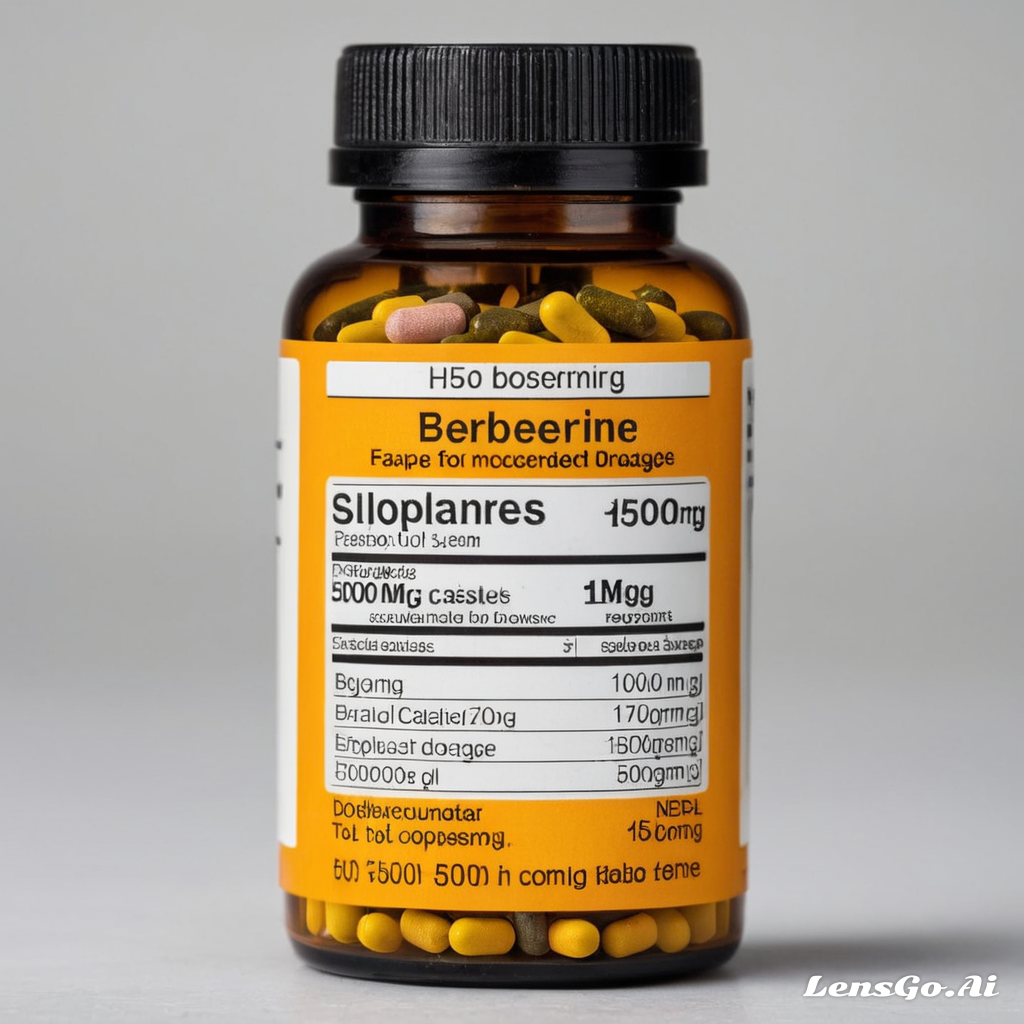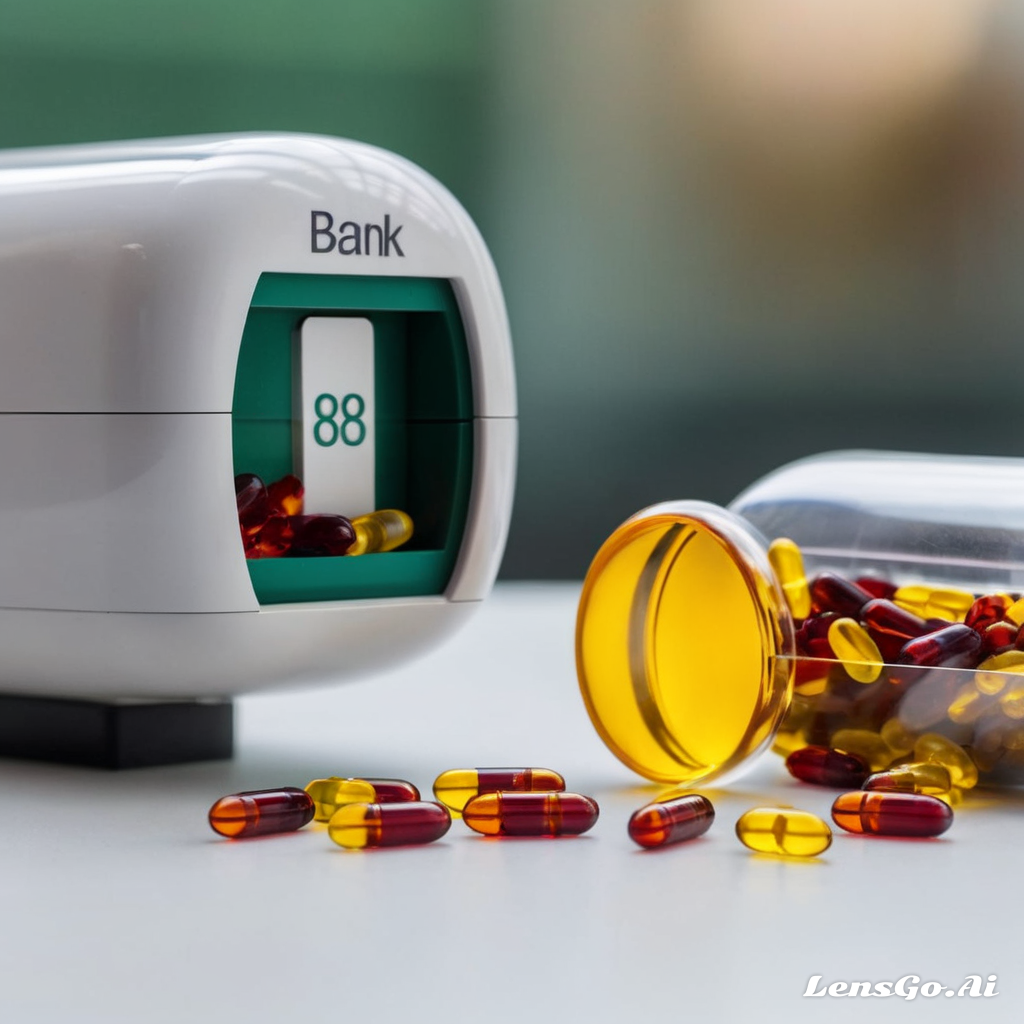Factors to Consider When Choosing a Berberine Supplement
When it comes to selecting a berberine supplement, you want to make an informed choice. Here are the key factors to consider:
1. Dose Matters
Why It Matters:
The right dosage ensures you reap the benefits of berberine without overdoing it. Too little, and you might not see results; too much, and you risk side effects.
What You Need to Know:
The optimal dose typically falls between 500mg and 1500mg per day.
Consider your health goals: Are you aiming for blood sugar control, weight loss, or gut health?
Start with a lower dose and gradually increase if needed.
Example: Imagine you’re managing blood sugar levels. Starting with 500mg per day allows your body to adjust. If you’re targeting weight loss, you might aim for the higher end (around 1500mg).

2. Quality Assurance
Why It Matters:
Quality matters—especially when it comes to supplements. You want a product that’s safe, effective, and free from contaminants.
What You Need to Know:
Look for third-party testing. Reputable brands undergo rigorous testing to ensure purity.
Check the sourcing: Sustainable and well-sourced berberine is a sign of quality.
Example: Choose a brand that proudly displays its testing certificates and sources berberine from trusted suppliers.

3. Absorption Boosters:
Why It Matters:
Berberine’s effectiveness depends on how well your body absorbs it. Enhancing absorption ensures you get the most out of your supplement.
What You Need to Know:
Some supplements include absorption-enhancing ingredients.
Black pepper extract (piperine) is a common booster—it helps berberine get absorbed.
Example:
Look for a supplement that combines berberine with piperine. It’s like having a VIP pass for berberine absorption!

Top Berberine Supplements:
When it comes to choosing a berberine supplement, you want to pick one that delivers results. Here are our top recommendations:
1. Enzymedica Berberine:
Why We Love It:
Sustainable Sourcing:
Enzymedica prioritizes environmentally friendly practices. Their berberine comes from reputable sources.
Affordability:
Quality doesn’t have to break the bank. Enzymedica offers value without compromising on effectiveness.
Targeted Delivery:
Imagine berberine as a secret agent—it gets delivered right where it’s needed.
Example:
Picture Enzymedica Berberine as your trusty sidekick on your health journey. It’s like having a reliable GPS guiding you toward better well-being.

2. HUM Nutrition Best of Berberine:
Why We Love It:
Robust Dose:
HUM Nutrition doesn’t hold back. Their berberine packs a punch with a generous 1200mg per serving.
Added Absorption Support:
It’s like they invited berberine to a VIP party—piperine (from black pepper) ensures it gets past the velvet rope into your system.
Example:
Think of HUM Nutrition Best of Berberine as the heavyweight champion in the supplement ring. It flexes its muscles and gets the job done.

3. Solaray Berberine Root Extract:
Why We Love It:
Budget-Friendly:
You don’t need a gold-plated wallet to afford Solaray. It’s kind to your pocket while still delivering berberine goodness.
535mg Per Serving:
Sometimes less is more. Solaray provides a moderate dose that’s perfect for beginners.
Example:
Solaray Berberine Root Extract is like the friendly neighbor who shares their garden-fresh produce. It’s reliable, down-to-earth, and won’t break the bank.

Health Benefits of Berberine:
Berberine isn’t just any ordinary compound—it’s like a superhero for your health. Let’s dive into its superpowers:
1. Blood Sugar Regulation:
Why It Matters:
Imagine berberine as a blood sugar whisperer. It helps your body listen to insulin better.
If you’re battling high blood sugar levels, berberine steps in like a calm mediator.
What You Need to Know:
Studies show that berberine can improve insulin sensitivity.
It’s like giving your cells a megaphone to hear insulin’s instructions clearly.
Example:
Think of berberine as the traffic cop directing glucose molecules to their proper parking spots. No more chaotic gridlock!

2. Cardiovascular Health:
Why It Matters:
Your heart deserves a standing ovation, and berberine takes center stage.
It helps lower cholesterol levels, keeping your heart’s backstage crew happy.
What You Need to Know:
Berberine may reduce LDL (the “bad” cholesterol) and total cholesterol.
It’s like sending the cholesterol villains packing—they don’t get VIP passes anymore.
Example:
Picture berberine as a friendly bouncer at the heart’s nightclub, ensuring only the good cholesterol gets in.

3. Immune Function:
Why It Matters:
Your immune system is the body’s security detail, and berberine hands out badges.
It helps modulate immune responses, keeping things balanced.
What You Need to Know:
Berberine supports immune cells, making them more efficient.
It’s like giving your immune system a pep talk: “You got this!”
Example:
Imagine berberine as the conductor of an immune orchestra, ensuring harmony and defense.

Potential Side Effects and Precautions:
Berberine is like a friendly neighbor who brings cookies to the block party—but even cookies have their limits. Here’s what you need to know about berberine’s side effects and how to play it safe:
1. Digestive Upset:
Why It Matters:
Berberine can sometimes stir things up in your tummy.
Think of it as a spicy curry—it adds flavor, but too much can lead to discomfort.
What You Need to Know:
Common side effects include bloating, cramps, and diarrhea.
Start with a lower dose to ease your digestive system into the berberine party.
Example:
Imagine berberine doing the cha-cha with your gut bacteria. A little dance is fun, but a full-on salsa might upset the rhythm.

2. Interactions:
Why It Matters:
Berberine is a social butterfly—it interacts with other substances.
Some interactions can be tricky, like mixing red wine with white clothes.
What You Need to Know:
Berberine may interact with medications, especially blood thinners.
Always check with your healthcare provider before inviting berberine to your supplement party.
Example: Think of berberine as the guest who asks, “Is it cool if I bring my friend, Medication X?” You want to make sure they get along.

3. Consult Your Healthcare Provider:
Why It Matters:
Your healthcare provider is like the wise elder at the village council.
They’ll guide you on berberine’s suitability for your unique situation.
What You Need to Know:
Before starting any new supplement, have a chat with your provider.
They’ll consider your health history, other medications, and individual needs.
Example: Imagine berberine sitting down with your provider, sipping herbal tea, and discussing your health goals. It’s like a personalized strategy session.

5. Potential Side Effects and Precautions:
Berberine is generally safe for most individuals, but it’s essential to be aware of potential side effects and take necessary precautions. Here’s what you need to know:
Digestive Upset:
At higher doses, some people may experience digestive discomfort. This can manifest as bloating, diarrhea, or stomach cramps. To minimize this risk, start with a lower dose and gradually increase it if needed. Remember, individual tolerance varies, so listen to your body.
Example: “If you notice any tummy troubles while taking berberine, consider splitting your daily dose into smaller portions. Taking it with meals can also help ease digestion.”
Interactions:
Berberine can interact with certain medications, particularly those that affect liver enzymes or blood clotting. If you’re taking medications like blood thinners, consult your healthcare provider before adding berberine to your regimen. They can advise you on potential interactions and adjust your dosages accordingly.
Example: “If you’re on blood-thinning medications, it’s crucial to discuss berberine with your doctor. They’ll help you find a safe balance between managing your health conditions and reaping the benefits of this natural compound.”
Consult Your Healthcare Provider:
Before starting any new supplement, especially if you have underlying health conditions or are pregnant, nursing, or planning to become pregnant, seek professional advice. Your healthcare provider can assess your individual situation and guide you toward safe and effective use of berberine.
Example: “Always prioritize your health. Reach out to your doctor or a registered dietitian to discuss berberine supplementation. They’ll consider your unique needs and help you make informed decisions.”

“People Also Ask” Queries:
Is Berberine Safe?
Safety is a top concern for anyone exploring new supplements. Here’s what you need to know about berberine’s safety profile:
Berberine Safety Considerations:
Generally Safe:
Berberine is well-tolerated by most individuals.
Pregnancy and Children:
If you’re pregnant or nursing, consult your healthcare provider before using berberine. The safety data for these populations are limited.
Children:
Berberine isn’t recommended for children unless specifically advised by a pediatrician.
Liver Health:
Berberine affects liver enzymes, so if you have liver conditions, seek professional guidance.
Quality Matters:
Choose reputable brands to ensure product purity and safety.
Example:
“Berberine is like a friendly neighbor—it’s generally safe, but you still want to know who’s knocking at your door. If you’re expecting a little one or have liver concerns, chat with your doctor before inviting berberine into your wellness routine.”
How Long Should I Take Berberine?
Timing matters when it comes to supplements. Here’s the scoop on duration:
Duration Guidelines:
Short-Term Use:
Berberine is often used in cycles. A typical cycle might be 4–8 weeks.
Maintenance:
Some people take lower doses for ongoing maintenance.
Listen to Your Body:
Pay attention to how you feel. If you notice benefits, keep going; if not, consider adjusting.
Example:
“Think of berberine as a seasonal guest. It drops by for a few weeks, helps out, and then takes a break. Listen to your body—when it whispers ‘I’m good,’ you can adjust your berberine schedule accordingly.”
Can Berberine Replace Metformin?
Metformin is a common medication for managing blood sugar. Let’s compare:
Berberine vs. Metformin:
Natural vs. Synthetic:
Berberine is a natural compound; metformin is a synthetic drug.
Similar Effects:
Both help regulate blood sugar levels.
Individual Response:
Some people find berberine effective; others prefer metformin.
Consult Your Doctor:
If you’re on metformin, talk to your healthcare provider before switching.
Example:
“Berberine and metformin are like cousins—they both help with blood sugar, but one’s from the garden, and the other’s from the lab. If you’re curious about swapping, chat with your doc—they’ll guide you toward the right path.”
What Foods Contain Berberine?
Nature’s pantry holds some berberine-rich goodies. Here are a couple:
Natural Berberine Sources:
Goldenseal:
This herb packs a berberine punch. It’s like the superhero of the plant world.
Oregon Grape:
Not just a pretty shrub—its roots contain berberine.
Example:
“Imagine goldenseal and Oregon grape having a secret meeting in the forest. They’re like, ‘Hey, let’s share our berberine superpowers!’ So, next time you’re in the woods, give them a nod—they’re doing wonders for your health.”
Berberine vs. Curcumin:
Berberine:
Blood sugar wizard, gut health enthusiast.
Curcumin (from turmeric):
Anti-inflammatory champ, joint supporter.
Combo Power:
Some folks take both for a double dose of wellness.
Example:
“Berberine and curcumin are like the dynamic duo of natural health. Berberine’s got the blood sugar groove, while curcumin’s all about calming inflammation. Together, they’re like a wellness playlist—play ’em both!”

Conclusion: Making Informed Choices:
Why Informed Choices Matter:
Selecting a berberine supplement isn’t a random grab-and-go decision. It’s more like choosing a travel companion—you want someone reliable, trustworthy, and aligned with your journey. Here’s how to wrap up your berberine adventure:
Consider Your Unique Health Needs:
Berberine isn’t a one-size-fits-all solution. Think about your health goals—whether it’s blood sugar management, heart health, or immune support. Then, pick a berberine brand that resonates with your needs.
Example:
“Picture yourself at a crossroads: one path leads to balanced blood sugar, the other to a happy heart. Choose wisely—your health compass knows the way!”
Expert Insights and Research:
Our recommendations aren’t pulled out of thin air. They’re backed by research, expert opinions, and a dash of common sense. Trust the process—we’ve done the legwork for you.
Example:
“Behind the scenes, our team of wellness wizards sifted through studies, debated over herbal tea, and high-fived when they found the best berberine picks. It’s like having a team of health detectives on your side!”

